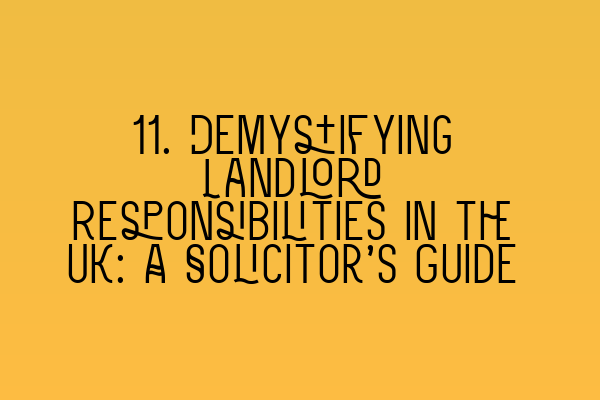Demystifying Landlord Responsibilities in the UK: A Solicitor’s Guide
Welcome to the SQE Property Law & Land Law blog, where we provide expert guidance on various legal issues related to property in the UK. In this article, we will demystify landlord responsibilities and guide you through the essential information you need to know as a landlord in the UK.
1. Introduction
Being a landlord comes with numerous legal obligations. Understanding these responsibilities is crucial to ensure compliance with the law and safeguard both your interests and those of your tenants. Let’s delve into the key areas you should be aware of as a landlord.
2. Health and Safety Regulations
The safety and well-being of your tenants should be a top priority. As a landlord, you must comply with various health and safety regulations, such as:
– Gas Safety Regulations
– Electrical Safety Standards
– Fire Safety Regulations
Click here for more information on SQE 2 preparation courses.
3. Repairs and Maintenance
It is your responsibility as a landlord to maintain the property you rent out in a good state of repair. This includes promptly addressing repairing issues, such as leaks, electrical faults, heating problems, and structural defects. Regular inspections can help identify potential maintenance needs and ensure compliance with legal requirements.
If you need assistance with your SQE 1 exam preparation, we recommend checking out our SQE 1 Preparation Courses.
4. Tenancy Agreements
A tenancy agreement sets out the terms and conditions of the tenancy. It is essential to have a well-drafted agreement that complies with the law and protects your interests as a landlord. The agreement should clearly state the rights and obligations of both parties, including details regarding the rent, maintenance responsibilities, and notice periods.
5. Deposit Protection
When renting out a property, you are required to protect your tenants’ deposits in a government-approved tenancy deposit scheme. Failure to do so can lead to severe financial penalties. It is crucial to ensure the deposit is protected within 30 days of receiving it and provide your tenants with the prescribed information regarding the scheme.
To complement your studies for the SQE exam, test your knowledge with our SQE 1 practice exam questions here.
6. Right to Rent Checks
As a landlord, you have a legal obligation to carry out right to rent checks on all prospective tenants to verify their immigration status and eligibility to live in the UK. Failing to conduct these checks or inadvertently renting to someone without proper documentation could result in severe penalties.
7. Maintenance of Common Areas (for HMOs)
If you are operating a House in Multiple Occupation (HMO), you have additional responsibilities for the maintenance of common areas, such as hallways, staircases, and shared kitchens or bathrooms. Compliance with HMO regulations is essential to ensure the safety and well-being of your tenants.
For more information on SQE exam dates, please visit our page providing SRA SQE Exam Dates.
8. Eviction Procedures
If you need to evict a tenant, it is vital to follow the correct legal procedures. Failure to do so can result in significant delays and potential legal repercussions. Familiarize yourself with the eviction process and seek professional advice to ensure your actions are lawful and comply with all relevant regulations.
9. Discrimination and Fair Treatment
As a landlord, it is essential to treat all tenants fairly and without discrimination. Under the Equality Act 2010, you must not discriminate against prospective or existing tenants based on their protected characteristics, such as gender, race, religion, disability, or sexual orientation.
10. Conclusion
Being a landlord in the UK involves a range of legal responsibilities that must be understood and complied with. By respecting health and safety regulations, properly maintaining your property, using well-drafted tenancy agreements, protecting deposits, conducting right to rent checks, adhering to HMO regulations (if applicable), following eviction procedures, and avoiding discrimination, you can ensure a positive and compliant landlord-tenant relationship.
We hope this guide has provided clarity and insights into the various responsibilities you have as a landlord in the UK. For more comprehensive preparation materials for the SQE exams, including practice mocks, we recommend exploring our SQE 1 Practice Mocks FLK1 FLK2.
Remember, seeking professional legal advice from a qualified solicitor is always recommended to ensure compliance with the latest regulations and to protect your interests as a landlord.
